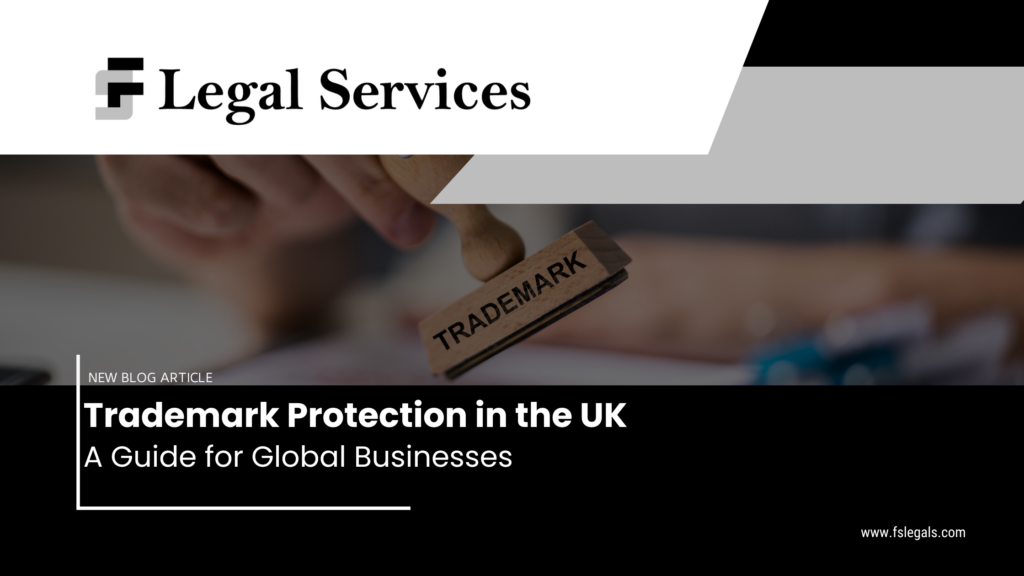Trademark Protection in the UK: A Guide for Global Businesses

In today’s global market, safeguarding intellectual property, particularly trademarks, is essential for businesses. Trademarks serve as a ‘badge of origin,’ distinguishing your goods and services from competitors. Whether you’re a UK-based business expanding internationally or a global company entering the UK market, trademark registration is crucial for protecting your brand identity.
- Why Trademark Registration is Essential in the UK
Legal Protection
Registering a trademark in the UK grants exclusive rights over the use of your brand’s name, logo, or distinguishing marks. A trademark lasts for 10 years, and you must renew it every 10 years to maintain its protection. This legal protection ensures that you can prevent competitors from using identical or confusingly similar marks. Without registration, businesses are exposed to the risk of brand dilution and potential loss of market share.
Brand Value
A registered trademark not only protects your brand but also adds tangible value to your business. It can be sold, licensed, or franchised, making it a valuable asset for market expansion. For companies entering the UK market, having a registered trademark also helps build credibility and trust with consumers.
Enforcement
With a registered trademark, businesses can swiftly take legal action against infringement. UK law allows trademark holders to issue cease-and-desist letters or pursue litigation to prevent unauthorised use of their mark. Without a registered trademark, businesses may face difficulties defending their brand in legal disputes.
- The Trademark Registration Process in the UK
Filing with the UK Intellectual Property Office (IPO)
The UK trademark registration process is managed by the UK IPO. Applicants must submit a TM3 form, specifying the goods and services the trademark will cover. The process typically takes four to six months, assuming there are no objections.
Types of Trademarks
In the UK, businesses can register various types of trademarks, including word marks (brand names), figurative marks (logos), and even unconventional marks such as sounds or colours. Each type of mark plays a key role in establishing a strong brand identity.
Common Pitfalls
One of the most frequent mistakes in the registration process is failing to conduct a thorough trademark search. Overlooking existing trademarks can result in conflicts, rejections, or even oppositions. Consulting with a trademark solicitor can help businesses avoid these risks and navigate the process smoothly.
- Trademark Symbols: ™ vs. ®
Understanding the correct use of trademark symbols is essential. The ™ symbol indicates an unregistered trademark, signifying that the business claims rights to a particular brand element. The ® symbol, however, should only be used for trademarks that have been officially registered. Misusing these symbols can have legal consequences.
For instance, using the ® symbol in jurisdictions where the trademark is not registered can lead to claims of unfair competition or, in some cases, criminal liability. It is essential for businesses to use these symbols accurately, particularly during the registration process.
- International Trademark Protection
Jurisdictional Limits
A UK-registered trademark only provides protection within the UK. Companies expanding into international markets must protect their trademarks globally. Without international protection, brands are at risk of infringement and exploitation in foreign jurisdictions.
International Registration
If you plan to use your trademark in countries outside the UK, you can apply to the trademark office in each country. However, European and international application systems also exist, offering benefits such as lower costs, simplified paperwork, and faster results.
The UK is a member of the Madrid Protocol, which allows businesses to extend their trademark protection to over 100 other countries through a single application. This streamlined process reduces administrative burdens, helping businesses safeguard their trademarks globally. However, an international application must be based on an existing UK trademark application or registration.
If you have already applied for a European Union Trade-Mark (EUTM) at the European Union Intellectual Property Office (EUIPO), you can use that as the basis for an international mark. However, the application must be made through EUIPO, following their specific forms and fees.
You can also use your UK trademark application to claim priority when applying for an international trademark, provided this is within six months. This means that your later application will be treated as if you applied on the same date as in the UK.
Post-Brexit Considerations
Following Brexit, UK trademarks no longer provide protection in EU member states. Businesses must now file separately with the EUIPO or use the Madrid Protocol to maintain protection in the EU. To protect your trademark in European Union countries, you can apply for a European Union Trade Mark (EUTM) through the EUIPO.
National Registrations
In markets not covered by the Madrid Protocol, or where businesses have significant operations, direct national registrations may be the best option. Countries such as China and India, where trademark infringement is common, should be prioritised for national filings to ensure comprehensive protection.
- Benefits of Trademark Registration and Avoiding Misuse
Stronger Enforcement Rights
Trademark registration provides businesses with stronger enforcement powers, enabling them to take legal action against unauthorised use. Registered trademarks also act as a deterrent to potential infringers, signalling the brand’s protected status.
Risks of Misuse
Misusing trademark symbols or failing to register trademarks can lead to significant legal risks. For instance, the unjustified use of the ® symbol can result in claims of misrepresentation or unfair competition. Businesses should seek legal advice to avoid these pitfalls and ensure proper use of their trademarks.
- Conclusion: Ensuring Comprehensive Trademark Protection
Trademark registration is a critical element of any global business strategy. In the UK, registered trademarks offer essential legal protection, add value to brands, and provide robust enforcement mechanisms. However, businesses must also think globally to protect their brands in international markets, using tools like the Madrid Protocol and national registrations.
For businesses navigating the complexities of trademark registration, consulting legal experts can ensure that all aspects of intellectual property protection are addressed, both in the UK and abroad.